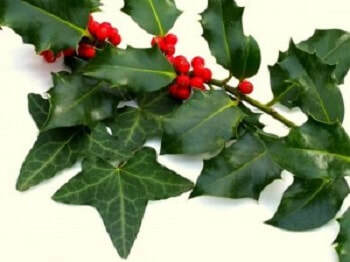The holly and the ivy
 Do you prefer the pub version or the choir version of the ‘Holly and Ivy’ folk song?
Do you prefer the pub version or the choir version of the ‘Holly and Ivy’ folk song?Holly
The word holly has its origins in Proto-Indo-European (PIE) kel (to prick), Proto-Germanic hulin, and Old English holegn and holen. The 12th century word holin precedes the mid-15th century word holly. Holly is an evergreen shrub long used as part of Christmas decorations.
Ivy
Ivy, a climbing plant, comes from Old English ifig. Before this the origin of the word ivy is unknown. In the mid-15th century, the image of an ivy bush was used on the signage of taverns which served wine, ivy being sacred to Bacchus, the Roman god of wine and other things (Bacchus, known as Dionysus in Greek mythology).
Holy & Ivy
In ancient times, holly was thought to be a male plant and ivy a female plant.
The ancient Romans used holly in different ways—to ornament the home as an omen of good fortune and immortality. Holly wreaths were sent to newlyweds for the same reason. And holly was used during the December Saturnalia festival. Early Christians, celebrating Christmas at this time, used holly as the spiky leaves symbolized Jesus’s crown of thrones and the red berries symbolized his blood. Harry Potter’s wand is made of holly, by the way.
Ivy, in addition to being associated with wine and intoxication as in the mythology of Bacchus and Dionysus, was also a symbol of fidelity and marriage. Ivy was wound into a crown, wreath, or garland as a symbol of prosperity and charity. As such, ivy was adopted by the early Christian church as a reminder to help the less fortunate.
The Christmas carol ‘The holly and the ivy’ is based upon ancient beliefs which were absorbed by the Christian church. The carol sung today was first recorded by Cecil Sharp, a folk song collector, who heard it sung in England in 1909.
Scroll down the following link for a couple of versions of the song: https://mainlynorfolk.info/steeleye.span/songs/thehollyandtheivy.html. I like the pub version!
Reference: Online Etymological Dictionary, https://www.etymonline.com/
https://davesgarden.com/guides/articles/view/2731
Published on December 22, 2022 10:45
No comments have been added yet.



